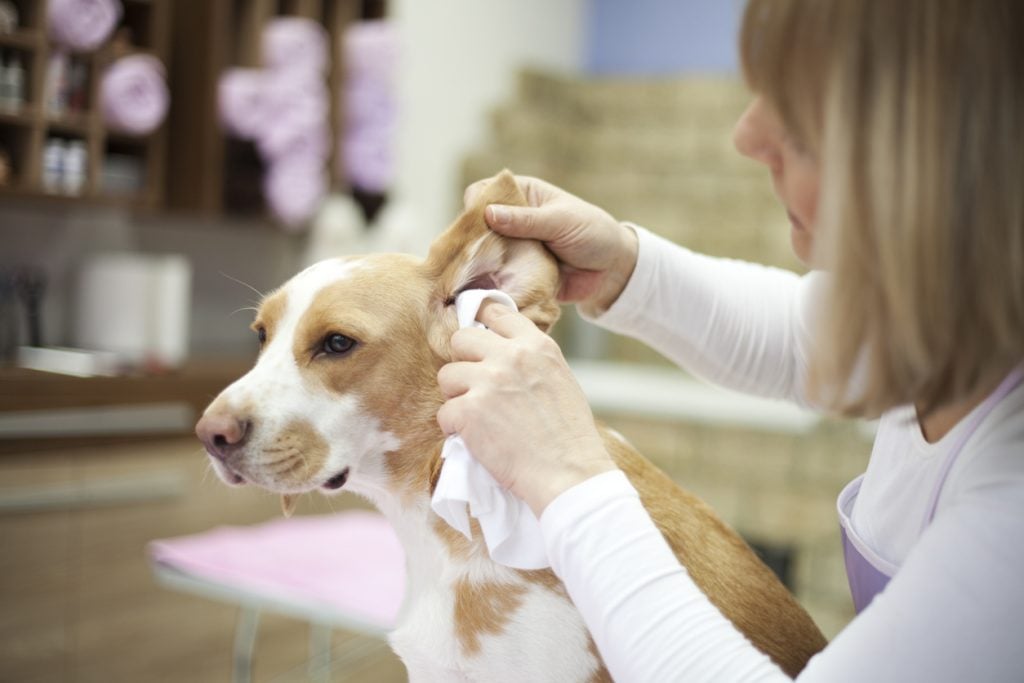- Not a substitute for professional veterinary help.
Catch your dog itching or pawing at their ears? Like many dogs, your pup might have an ear infection. Ear infections in dogs are common, present a wide range of mild or severe symptoms, and affect one or both of the ears. Some of the most telltale symptoms of an ear infection include persistent itchiness, a foul odor, and ear redness.
There are three main types of ear infections:
- Otitis externa: Inflammation and/or infection of the external ear canal (most common)
- Otitis media: Inflammation and/or infection of the middle ear (chronic)
- Otitis interna: Inflammation and/or infection of the inner ear (most severe)
Importantly, ear infections in dogs won’t resolve on their own and require prompt veterinary care. If an infection is left untreated, it may result in discomfort, pain, dry eyes, permanent hearing loss, facial paralysis, or loss of balance.
We spoke with veterinary experts on how to spot the signs of ear infections in dogs, their causes, treatment options, prevention tips, and more.
What Are the Symptoms of Ear Infections in Dogs?
Healthy dog ears are clean, dry, odorless, and pale pink with light-colored wax. Dr. Nicole Savageau, DVM, a veterinarian for the mobile pet care company, The Vets, says an infection may cause the following symptoms:
- Head shaking
- Foul or yeasty odor
- Redness
- Swelling
- Head tilt
- Scratching
- Increased discharge
- Scaly skin
- Walking in circles
- Rubbing their ears on the floor
- Pawing at their ear(s)
Dr. Savageau says ear infections can affect a dog’s hearing, especially if left untreated. Signs of hearing impairment due to ear infections may include:
- Difficulty responding to commands
- Decreased responsiveness to sounds
- Increased sensitivity to loud noises
“In severe cases, the infection can lead to swelling or damage to the structures involved in hearing, such as the tympanic membrane (eardrum) or the auditory ossicles (tiny bones in the middle ear),” she says.
What Causes Ear Infections in Dogs?
Several primary factors and underlying causes can contribute to the development of ear infections in dogs by compromising the environment of the ear. Some of these include:
- Allergies
- Parasites
- Foreign bodies
- Autoimmune or immune-mediated
- Epithelialization disorders
- Glandular disorders
- Microbes (bacteria like Staphylococcus, Streptococcus, Enterococcus, etc.)
- Yeast (Malassezia)
- Reactions to medications
- Excessive cleaning of ears
Besides health causes, anatomical factors that contribute to increased susceptibility to ear infections include:
- Long, floppy ears
- Hairy pinnae and/or ear canals
- Pendulous pinnae
- Increased density and altered physiology of ceruminous glands
- Narrow ear canals or atresia
Lastly, hot and humid environments, swimming, overcleaning the ears, dietary sensitivities, and routine hair plucking can impact a dog’s ear health.
Which dog breeds are more likely to get ear infections?
Any dog can get an ear infection. However, certain dog breeds are more prone to developing ear infections due to having long, floppy ears, excessive hair growth in the ear canal, or narrow ear canals or atresia.
These breeds include:
- Cocker Spaniels
- Basset Hounds
- Beagles
- Poodles
- Chinese Shar Pei
- Jura des Alpes
- Brittany Spaniels
- Golden Retrievers
- West Highland White Terriers
- Bloodhounds
Although ear infections can occur at any age, Dr. Savageau says they’re more commonly seen in adult and senior dogs.
How Do Vets Diagnose Ear Infections?
Dr. Bethany Hsia, DVM, co-founder of CodaPet, says vets can differentiate between bacterial, fungal, and yeast ear infections in dogs through a combination of clinical examination, cytology (i.e., microscopic evaluation of ear discharge), and/or culture and sensitivity testing. She explains the differences between the three types of ear infections in dogs:
- Bacterial: It is often associated with a foul odor, discharge that may be yellow or green, redness or swelling of the ear canal, and can be painful. Treatment typically involves topical or oral antibiotics prescribed by the veterinarian.
- Fungal: This type causes similar symptoms to bacterial infections but may have a distinct appearance under the microscope. They may present with black debris in the ear canal or a musty odor. Antifungal medications are usually required for treatment.
- Yeast: This is commonly caused by Malassezia species and can result in a dark brown discharge with a sweet or musty smell. Antifungal medications like clotrimazole are often used to treat yeast infections.
Other conditions that could mimic an ear infection include:
- Ear mites
- Foreign bodies in the ear canal
- Allergies
- Ear tumors
- Hematomas
- Vestibular disease
In some cases where chronic ear issues persist despite treatment, Dr. Hsia says a vet might recommend further diagnostics, like hearing tests, to rule out underlying causes. Generally, she says anesthesia isn’t necessary for routine examination of an ear infection unless a dog is in significant pain or discomfort that prevents a thorough evaluation. However, she adds that if deep cleaning or more invasive procedures like biopsies are needed, sedation or anesthesia might be required for the dog’s safety and comfort.
How to Treat Ear Infections in Dogs
Treatments for ear infections vary depending on the underlying cause and symptoms. Generally, a vet will clean a dog’s ear(s) and provide medicated ear drops, an anti-inflammatory or antimicrobial therapy. Glucocorticoids or steroids may also help in some cases. In severe cases, surgeries like total ear canal ablation (TECA) and ventral bulla osteotomy (VBO) may be necessary.
“For mild cases of ear infections in dogs, pet parents may be tempted to try home remedies or over-the-counter treatments,” Dr. Hsia says. “While some mild cases might respond to gentle cleaning with appropriate solutions recommended by veterinarians, it’s crucial to consult with a vet before attempting any treatment at home.”

iStock/M_a_y_a
Can You Prevent Ear Infections in Dogs?
While ear infections are common, they can be prevented. Proactive measures, such as routinely checking your dog’s ears for wax or debris buildup, cleaning their ears weekly, and scheduling annual vet visits, can help minimize the risk of ear infections.
For at-home ear cleaning, Dr. Savageau recommends using a solution recommended by your vet (avoid DIY ear cleaners).
- Prepare the cleaning area. Choose a well-lit, quiet area to comfortably clean your dog’s ears. Have your supplies within reach.
- Examine the ears. Gently inspect your dog’s ears for redness, swelling, discharge, or odor. If you notice any abnormalities or discomfort, consult your vet beforehand.
- Apply the ear-cleaning solution. Follow the instructions on the solution bottle. Typically, you’ll apply a few drops of the solution into the ear canal, then gently massage the base of the ear to help distribute it.
- Wipe away debris. Use a cotton ball or gauze pad to gently wipe away any debris or excess solution from the outer part of the ear canal. Avoid inserting anything beyond what you can see into the ear canal, as this can potentially damage the eardrum.
- Reward your dog. Praise your dog and offer treats for staying calm during the cleaning. This positive reinforcement can help make future cleanings easier.
- Repeat if necessary. If your dog’s ears are particularly dirty, you may need to repeat the cleaning process. However, avoid over-cleaning; this can disrupt the natural balance of the ear canal and potentially lead to irritation or infection.
- Monitor for improvement. In the days following cleaning, keep an eye on your dog’s ears. If you notice any signs of continued irritation or worsening symptoms, consult your vet for further evaluation and treatment.
Lastly, regular grooming and veterinary appointments can help prevent ear infections or detect them early.
How to Care for a Dog With an Ear Infection at Home
If your dog has an ear infection, a few home care practices can alleviate their discomfort and promote healing. These include:
- Keeping their ears clean and dry
- Using an e-collar to prevent scratching their ears
- Trimming their nails to prevent injury to ears
Your vet will explain what treatment is needed for the infection to clear and how long it will take. Avoid using natural remedies or alternative therapies, like vinegar or hydrogen peroxide, in conjunction with conventional treatments to prevent a delay in healing or possibly worsening symptoms.





